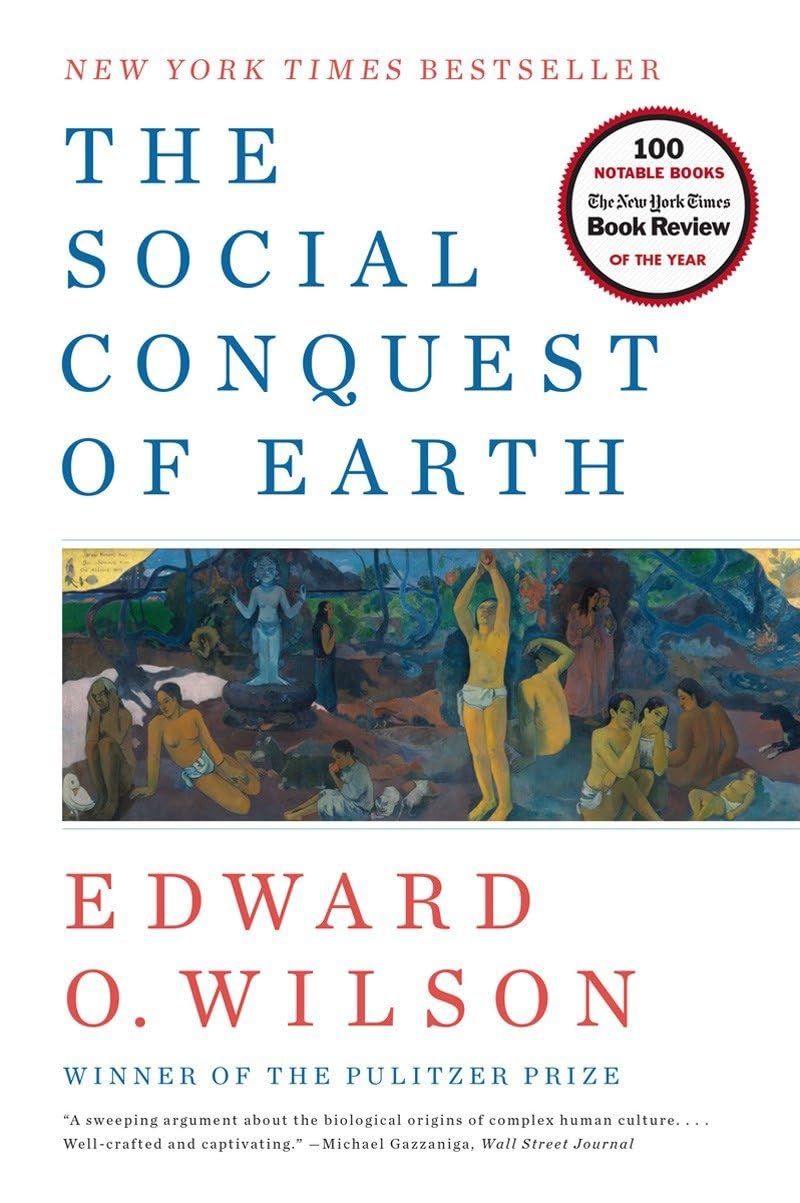


The Social Conquest of Earth
R**E
An important synthesis, provocative perhaps but very rewarding
Many readers may have read EO Wilson's expert work on ecology, ants and evolutionary selection in order to think through deeper insights into the human behaviour and history. In this book, Wilson takes the guesswork out of it, providing logical and evidence-based views on the human condition. He posts a question in his Prologue which considers the life of the restless and irrepressible artist, Gauguin - is the human condition understandable through the scientific enquiry? Wilson is one of the best qualified people on the planet to weigh up the importance of individual, group and multi-level selection for a species, areas of science directly relevant to Gaugin's question.From a human perspective, the different mechanisms of tribalism are examined and its causes are analysed, pointing the finger past religion to competition for resources. An examination of the phenomenon of eusociality in insects, while fascinating in its own right, lends insights for human behaviour and societies. The reader is taken on an expertly guided tour of contemporary theories in social evolution, sometimes a little theoretical but easy enough to get your head around. The logical and simply explained chapter `Insects take the giant leap' is a key to understanding one of the most interesting aspects of biology. Similarly, `The forces of social evolution' sums up the gains and losses of the last few fifty years of research in this area, essentially comparing the merits of group selection and kin selection theory.The final parts of this book ask `What are we?' and `Where are we going?', collating information provided earlier or from referenced arguments to examine the roles and importance of language, culture, morality and creativity. Insights abound and set the stage for Wilson's final chapter 'A new enlightenment' which achieves two objectives: it shows that scientific enquiry can lead us to the big answers, and offers a lucid, optimistic and compelling synthesis of what really matters and where to next for human society. This book is transformative - some of Wilson's specific interpretations will be challenged but what's new about that - he has taken on an enormous topic and provided a synthesis unequalled in scope and contemporary relevance. I am pleased to see this point is drawn out by the significant and ranging commentary offered by the reviews at this site.
A**T
A Brief Summary and Review
*A full summary of this book is available here: An Executive Summary of Edward O. Wilson's 'The Social Conquest of Earth'The main argument: Since the dawn of self-awareness we human beings have struggled to understand ourselves. This struggle has found form in religion, philosophy, art and, most recently, science. The most pivotal turning point in science's quest to understand humanity came with Charles Darwin's theory of evolution by natural selection in the mid 19th century. While the application of this theory to understand human behaviour has taken time (and engendered a great deal of controversy), enough progress has now been made to outline the story in full, and to fill in several of the details. It is just this task that legendary biologist E.O. Wilson takes up in his new book `The Social Conquest of Earth'.For Wilson, understanding humanity must begin with an understanding of how we came to be the ultrasocial species that we are. Drawing upon evidence from other eusocial species (such as bees, wasps, termites and ants--the latter of which Wilson has spent much of his career studying), as well as numerous sciences focused in on humanity and its past, Wilson recreates this story. According to the author, the story reaches its first major turning point when our ancestors began establishing home-bases at which they raised their young, and near which they foraged and scavenged for food. This development itself was largely a result of a genetic modification that led our ancestors to rely more and more on meat in their diet (and was greatly spurred on by, if not entirely dependent upon, the ability to control fire, which fire was used to establish more lasting campsites).Once human beings had established nests, environmental pressures began selecting for traits that increasingly drew group members into cooperative relationships with one another (which cooperation was beneficial in such enterprises as hunting expeditions). This added cooperation not only contributed to the extent to which these early humans could reap resources from the environment, but also helped them in competition with other groups--especially in warfare. The benefits of cooperation and cohesion in allowing groups to out-compete other groups eventually allowed group-level selection to add a layer of tribalist sentiment to the members of our species (which tribalist sentiment draws from us a deep attachment to our in-groups, and a corresponding mistrust and contempt for members of out-groups). This tribalist sentiment eventually set the stage for the development of the first religions. The cooperative and tribalist sentiments that evolved during this time ultimately explains why our psyches are torn between selflessness and selfishness, virtue and vice. (On the topic of group-level selection, it turns out that this theory has been out of favour in the scientific community for over 40 years, and a big part of Wilson's purpose here is to resurrect the theory, and reestablish its credibility.)Backing up in our story just a bit, for our in-group cooperation to occur, added mental equipment was needed (and evolved) that allowed humans to understand each others' intentions and work together to achieve goals. This added mental ability drew upon earlier increases in brain capacity that our ancestors had used first for life in the trees, and later for life on the ground, to fashion rudimentary tools. Eventually, the added mental capacity evolved into the ability to understand abstraction, and to use arbitrary symbols for communication, thus leading to the evolution of language.Once the capacity for abstraction and language were established, the capacity for culture exploded and our ancestors were set on the fast track that led to our current way of life. Specifically, the onset of language led to the development of religion, art and music, and all of the other trappings of culture that we know and enjoy today. Wilson takes us through each of them one by one, and the process of gene-culture co-evolution that acted upon them, in order to help us understand how this process unfolded. Later, the explosion of culture led to technology that eventually gave rise to agriculture, and then to the rise of chiefdoms, and finally states and the first true civilizations.Wilson's work is well geared to a general audience and he very rarely goes outside of what might reasonably be expected from such an audience. On the rare occasions when he does, he is sure to follow this up with a simplified summary of his line of thought. Also, Wilson occasionally strays outside of his story to moralize and (at the end) prognosticate on the future, and at times these efforts seem awkward and out of place. Again, though, these forays are few and far between, and many will no doubt enjoy them. A full summary of the book is available here: An Executive Summary of Edward O. Wilson's 'The Social Conquest of Earth'
R**L
du grand E.Wilson
un plaisir à lire comme toujours dans le cas de E.Wilson
P**M
The Social Conquest of Earth
The book was fine until Wilson start to write human sociality. Eusociality is known since 1966 and as a concept of sociality it is useful. But it is not sufficient to account human sociality which as cultural system belongs to different level.
A**R
Great one. And I mean "great".
This is an amazing book. In 1975, E. O. Wilson wrote a book that made an era. This one is certainly not as thorough in studying its topic, but I think it will also eventually be seen as having made an essential contribution in evolutionary biology. After decades of ignoring group selection and multilevel selection in favoring "genes" or "egoism" as unit of selection, Wilson now presents irrefutable arguments in favor of both multilevel and especially or specifically group selection. The merit of such a broader approach is clear: it explains with much more ease numerous behaviors that the egotistic perspective pained in explaining. I cannot recommend enough this book. Every one interested in biology and evolution should have it. Written in 2012, we're just starting to feel its impact on the field.
D**C
brilliant
E. O. Wilson at his usual brilliant self.
S**S
excelente exposición del estado de la cuestión en ética evolutiva
excelente exposición del estado de la cuestión en ética evolutiva, por el padre de la sociobiología que ha superado sus tesis, algo simplistas, iniciales
Trustpilot
3 weeks ago
1 month ago